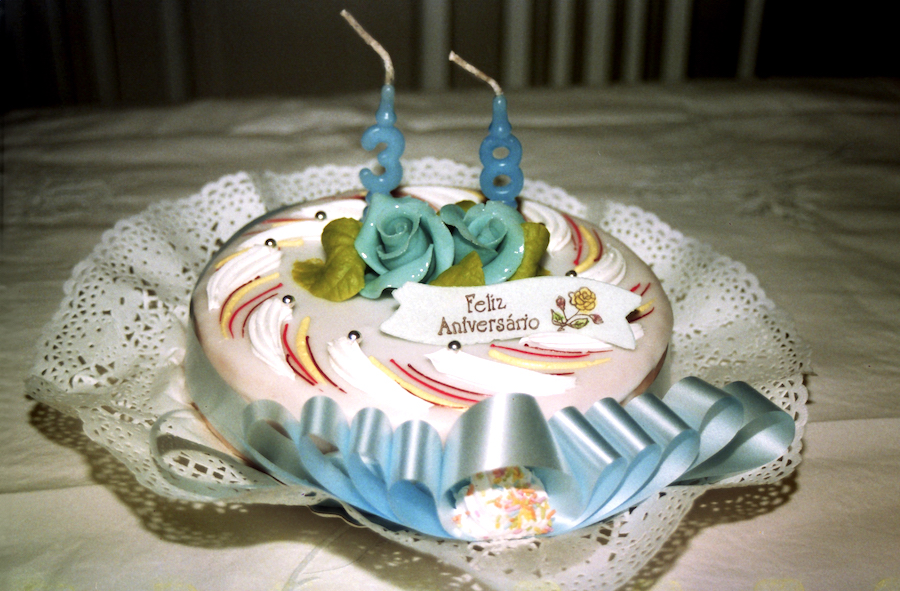Birthday Cake

Photo courtesy of the author
The CASE FILE series — to which SEMIOVOX has invited our semiotician colleagues from around the world to contribute — shares stories of things we were amazed and amused to learn, whether or not they proved useful to the client.
Once, when analyzing the wider world of sweets, treats, and cakes, I found myself rather baffled by Birthday Cake motifs.
OK, the botanical stuff — marzipan flower petals and leaves, that sort of thing — signify transience, which makes sense since a birthday cake marks the passage of time, the start of a new phase. But what about the marbled stone-like slabs with a boy’s or girl’s name on it, the candles shaped like numbers, and the strangely hard/inedible/shiny decorations… like those little silver balls? It’s all quite absurd. But we semioticians love to analyze the absurd!
These days, birthday cakes are often covered with frosting or ganache — they’re airtight, perfectly smooth, a rubbery “black box” of sorts, offering no clue as to what’s inside. They’re sculptures. When I started thinking about sculptures with names, numbers, and uplifting expressions carved onto them (remember those marbled stone-like plaques I mentioned), I realized… Oh! Gravestones.
Birthday cakes — in their contemporary smoothness and polish, their sculptural details, their information about names and dates, their inspiring messages, their marbled patterns and botanical effects — share a lot of attributes with gravestones, don’t they? Both mark significant turning points in a person’s passage through time.
I was thrilled by my discovery. I’d never think about birthday cakes — and the singing, blowing out the candles, etc. — the same way again. Like so many things I’ve figured out in the course of my work, this little aha! moment re-inspired my enthusiasm for what I do. The world is full of hidden significance, invisible connections… what a joy and a privilege to be paid to notice these sorts of things.
Adrenaline pumping, I ran around Lisbon taking so many photos of birthday cakes… and of gravestones, too. Old-fashioned birthday cakes and old-fashioned gravestones are similar to one another; in recent years, both have become more clean, smooth, shiny, perfect. I confess to feeling thrilled with this insight. It showed the degree of articulation between the signs and how meaning depends on articulation. Until… I realized that my “sweets, treats, and cakes” client would be creeped out by these learnings.
You can’t tell clients looking to optimize birthday-cake design that they need to think about gravestones. Death is a taboo subject in polite company, and all the more so in this sort of context. People don’t like to think about such things, and I didn’t want to be the Wednesday Addams who rubbed their faces in such morbid insights. So I suppressed this project learning… until now.
CASE FILE: Sónia Marques (Portugal) on BIRTHDAY CAKE | Malcolm Evans (Wales) on PET FOOD | Charles Leech (Canada) on HAGIOGRAPHY | Becks Collins (England) on LUXURY WATER | Alfredo Troncoso (Mexico) on LESS IS MORE | Stefania Gogna (Italy) on POST-ANGEL | Mariane Cara (Brazil) on MOTHER-PACKS | Whitney Dunlap-Fowler (USA) on WHERE THE BOYS ARE | Antje Weißenborn (Germany) on KITSCH | Chirag Mediratta (India) on “I WATCH, THEREFORE I AM” | Eugene Gorny (Thailand) on UNDEAD LUXURY | Adelina Vaca (Mexico) on CUBAN WAYS OF SEEING | Lucia Laurent-Neva (England) on DOLPHIN SQUARE | William Liu (China) on SCENT FANTASY | Clio Meurer (Brazil) on CHOCOLATE IDEOLOGY | Samuel Grange (France) on SWAZILAND CONDOMS | Serdar Paktin (Turkey/England) on KÜTUR KÜTUR | Ximena Tobi (Argentina) on SLUM PANDEMIC | Maciej Biedziński (Poland) on YOUTH LEISURE | Josh Glenn (USA) on THE AMERICAN SPIRIT | Martha Arango (Sweden) on M | Chris Arning (England) on X | Peter Glassen (Sweden) on WHEN SHABBY ISN’T CHIC | Joël Lim Du Bois (Malaysia) on RECONSTRUCTION SET | Ramona Lyons (USA) on THE FALL.
Also see these global semio series: MAKING SENSE (Q&As) | SEMIOFEST SESSIONS (monthly mini-conferences) | COVID CODES | SEMIO OBJECTS | COLOR CODEX | DECODER (fictional semioticians) | CASE FILE | PHOTO OP | MEDIA DIET | TATTOO YOU (semioticians’ tattoos).

